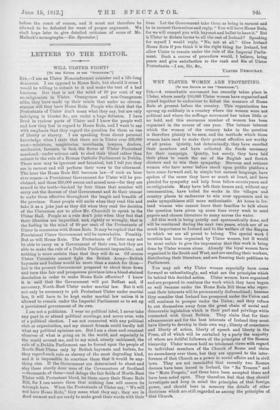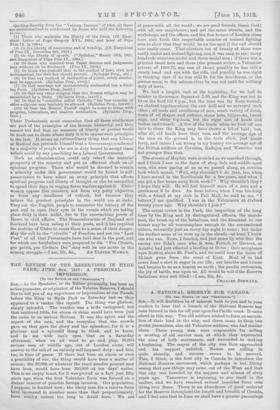WHY ULSTER WOMEN ARE PROTESTING.
[TO THE EDITOR Or Tea "SPECTATOR:]
SIR, —A remarkable movement has recently taken place in Ulster, where nearly 100,000 Ulster women have organized and joined together to endeavour to defeat the measure of Home Rule at present before the country. This -organization has sprung up suddenly in a country where the women were not political and where the suffrage movement has taken little or no hold, and this enormous number of women has been organized in the course of one year. The intense interest which the women of the country take in the question is therefore plainly to be seen, and the methods which these women have used to make their protest effective are worthy
of all praise. Quietly, but determinedly, they have enrolled their members and have collected the funds necessary for their campaign. Quietly, but surely, they have laid their plans to reach the ear of the English and Scotch electors and to win their sympathy. Nervous and reticent women who have never before stood upon public platforn s have come forward and, in simple but earnest language, have spoken of the cause they have so much at heart, and have pleaded for sympathy and help from fellow-countrymen and co-religionists. Many have left their homes and, without any remuneration, have toiled for weeks in the villages and country places to endeavour to win over opponents and to make sympathisers still more enthusiastic. At home in Ire- land women who cannot leave their families to talk about the question have given up some time every week to send papers and chosen literature to many across the water.
All this work is being quietly and systematically done, and will be continued during the next two years, which are of so
much importance to Ireland and to the welfare of the Empire
to which we are all proud to belong. The special work I mention has been organized by Ulster women, but it would be most unfair to give the impression that this work is being done by Ulster women alone. Already the loyal women have organized in the South and West, and are sending their workers, distributing their literature, and are framing their petitions to Parliament.
You may ask why Ulster women especially have come forward so unhesitatingly, and what are the principles which lie behind this decided action. Ulster women have organized and are prepared to continue the work which they have begun so well because under the Home Rule Bill those who repre- sent their interests will be permanently disfranchised; because they consider that Ireland has prospered under the Union and will continue to prosper under the Union; and they refuse to cut themselves away from the great chain of social and democratic legislation which is their part and privilege while connected. with Great Britain. They claim that for their advancement and for the best interests of Ireland they must have liberty to develop in their own way ; liberty of conscience and liberty of action, liberty of speech and liberty in the Press, all of which will be curtailed by a party the majority of whom are dutiful followers of the principles of the Roman hierarchy. Ulster women hold no intolerant views with regard to individual members of the Church of Rome and claim no ascendancy over them, but they are opposed to the inks- ference of that Church as a power in social affairs and in civil laws. They are not unmindful that recently two Roman decrees have been issued in Ireland, the "Ne Temere" and the " Motu Proprio," and these have been accepted there and have been acted upon. They therefore feel that they should investigate and keep in mind the principles of that foreign power, and should bear in memory the details of other doctrines which are still regarded as among the principles of that Church, Quoting directly from the " Vatican Decrees" of 1864, all those are anathematized or condemned by Rome who hold tho following views :- (1) Those who maintain the liberty of the Press. (Cf. Ency- clical Letter of Pope Gregory XVI., 1831, and later of Pope Pius IX. in 1864.) (2) Or the liberty of conscience and of worship. (Cf. Encyclical of Pius IX., December 8th, 1864.) 3) Or the liberty of speech. (" Syllabus," March 18th, 1861, and Encyclical of Pope Pius IX., 1864.) (4) Or those who contend that Papal decrees and judgments may without sin be disobeyed. (Pius IX., 1884.) (5) Or those who contend that in the conflict of laws, civil and ecclesiastical, the civil law should prevail. (Syllabus Prop., xlii.) (6) Or that any method of instruction of youth, solely secular, may be approved. (Syllabus Prop., xlviii.) (7) Or that marriage not sacramentally contracted has a bind- ing force. (Syllabus Prop., lxxiii.) (8) Or that any other religion than the Roman religion may bo established by a State. (Syllabus Prop., lxxvii.) (9) Or that in " countries called Catholic" the free exercise of other religions may laudably be allowed. (Syllabus Prop., lxxviii.) (10) Or that the Roman Pontiff ought to come to terms with progress, Liberalism, and modern civilization. (Syllabus Prop., lxxx.) Ulster Protestants must remember that all these anathemas are part of the principles of the Roman hierarchy, and they cannot but feel that no measure of liberty or justice would be dealt out to those whose duty it is to oppose such principles to the last. It seems an extraordinary thing that any Liberal or Radical can persuade himself that a Government conducted by a majority of people who are in duty bound to accept these beliefs could by any possibility be a Liberal Government.
Such an administration could only retard the material prosperity of the country and put an effectual check on all spiritual progress. Those who would be doomed to remain a minority under this government would be bound in self- preservation to keep silent on every principle that affects spiritual progress and liberty of thought or else be compelled to spend their days in waging fierce warfare against it. Ulster women oppose this measure, not from any petty objection or from any smallness of outlook, but because they believe the greatest principles in the world are at stake. They ask the English people to remember the history of the past and to open their eyes to the events which are taking place daily in their midst, due to the encroaching power of Rome in civil affairs. The Nonconformists of England and Scotland have been asleep at their posts, and it has required the sentries of Ulster to rouse them to a sense of their danger. May the call be the " r6veill6 " of Freedom and not the "Last Post" of all that Protestants have held dear in the past, and for which our forefathers were prepared to die. " Pro Christo, pro patrik pro Civitate Dei " may well be our motto in the coming struggle.—I am, Sir, &a, AN ULSTER WOMAN.











































 Previous page
Previous page